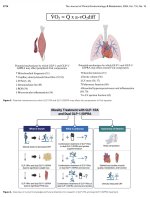GLP-1 drugs significantly improve functional capacity, even with no exercise or improvement in cardiovascular fitness. Simply weighing less substantially improves your ability to do normal daily activities, and is especially obvious in things like walking, walking up hills or stairs, and just getting up from a couch or bed. If you are not severely overweight and younger and fitter, then this may be less obvious, but for me the difference in weight from 145kg to 71kg made an enormous difference to my ability to do anything physical.
Now, GLP-1 drugs were not actually responsible for most of that weight loss, but are definitely making a huge difference to my ability to keep the weight off.
While I was losing weight, and still fairly heavy I noticed a huge difference in walking up a steep hill from just 10kg weight loss, from having to stop halfway to breathe to being able to make it to the top, and it was obvious at the time my leg muscles were shrinking. Not to mention every joint in my feet hurt like hell walking at 115 kg, pain was gone by about 85kg.
Generally the loss in muscle mass with weight loss from GLP's is proportional and does not result in lowered physical capacity, but generally improves it , mainly as not as much muscle is required to move the lowered total mass.
I am not suggesting that reasonable or high protein intake, aerobic and resistance training are a bad idea, they will improve health and capability as weight loss occurs, but improvements occur without their benefits, just from weight loss. And the long term benefits of GLP drugs on cardiovascular, kidney disease, diabetes, arthritis, cancer and many other outcomes will still occur without exercise. A fairly large percentage of the population do not succeed in maintaining regular exercise, and I would guess this is more likely in those who might benefit from GLP's. And initiating and maintaining regular exercise is less difficult at lower body weights.


